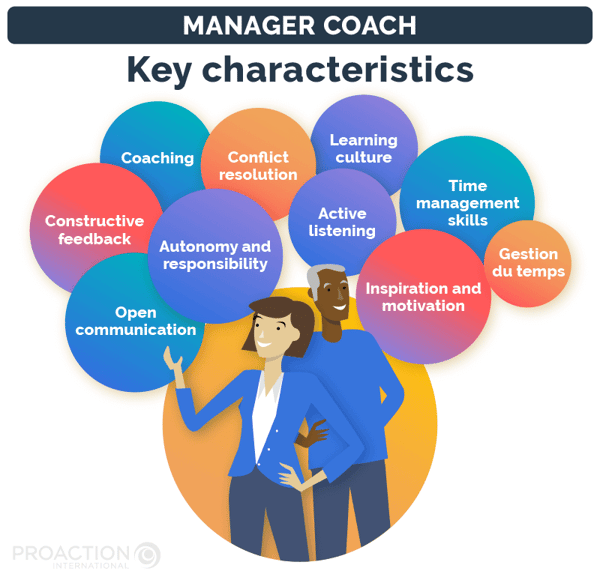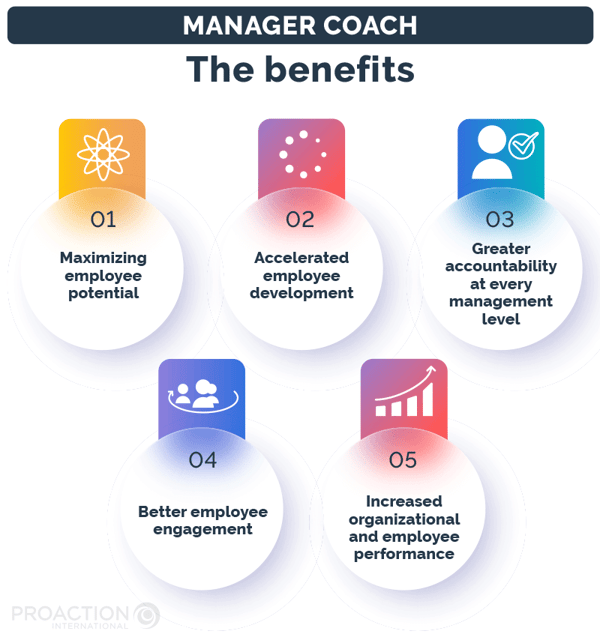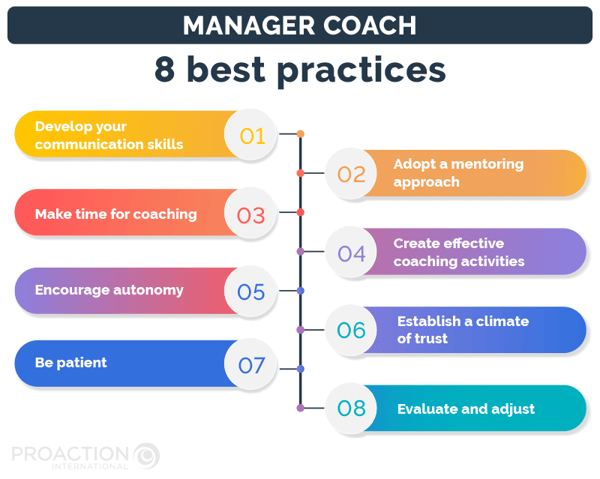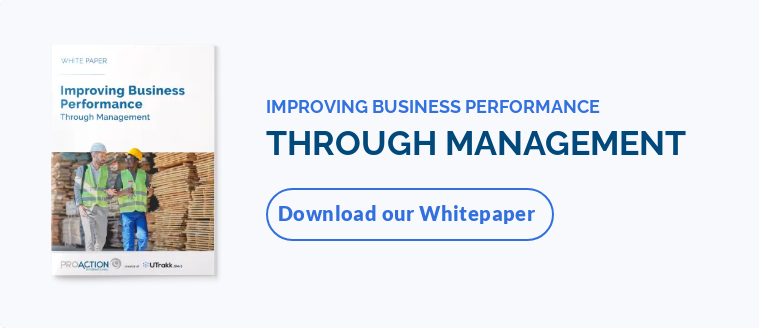The manager's roles and responsibilities
Managers have many roles to play daily, often lacking time for employee skill development. Organizations and their leaders, therefore, routinely pass this responsibility on to the Human Resources department, which, in most cases, translates into a training offer made available to workers. Subsequently, the challenge for the employees and the organization is making the most of this investment in day-to-day operations.
But why not share this responsibility and emphasize the importance of the manager's role as coach in developing employee skills?
The frontline manager frequently interacts with employees. They know what is expected from them, their job experience, and the skills they need. They are in a position to identify executive coaching opportunities – from which they will benefit firsthand.
But they’re not the only ones: all managers, regardless of their level, can gain from adopting the manager-coach posture.
What is employee executive coaching?
It can be described as a type of management or leadership that combines the traditional role of a manager with the role of a coach.
This approach is based on developing employees' potential by guiding, supporting, and encouraging them to achieve their professional and personal goals. It targets both experienced employees and new ones.
The manager-coach not only gives orders or supervises team members but also plays an active role in their growth. This style of leadership approaches management in a more human and collaborative way. It aims to strike the right balance between fulfilling employees' interests and achieving business objectives.

Here are some of the main skills and characteristics of a manager-coach:
- Mentoring and skills development
- Open communication
- Autonomy and responsibility
- Constructive feedback
- Inspiration and motivation
- Active listening
- Conflict resolution
- Learning culture
- Time management skills
- Coaching skills
The benefits of coaching employees
Here are some of the positive impacts that employee coaching can have on your employees and the company as a whole.

Maximizing employee potential
During coaching activities, the manager-coach can contribute in a more meaningful way to the employee’s professional fulfillment by helping them to work on their strengths, thus developing their potential. The employee feels valued, and the organization reaps the benefits of a highly engaged and committed workforce.
Accelerated employee development
By carrying out effective coaching sessions regularly, the manager-coach increases the frequency of interventions and their quality – both key factors in boosting employee’s progress.
Greater accountability at every management level
When a team member cannot perform a task, their immediate supervisor often has to compensate. By accompanying them, the manager-coach can empower them. Instead of simply issuing orders with authority, they encourage autonomy, initiative, and creativity within the team.
Meanwhile, delegation frees the coach's time to invest in their administrative tasks.
Better employee engagement
- According to a study conducted by the Harvard Business Review, the more effective a leader is at developing and coaching employees, the more engaged and committed their direct reports will be.
- Another interesting finding, this time from the Gallup research company: 70% of a team's engagement is influenced by managers.
These results show that the way managers lead and encourage employees has a great impact not only on the employees themselves but also on the company as a whole.
By building trusted relationships based on recognition and nonviolent communication, the manager-coach enables their employees to feel more involved and determined. This increases engagement which leads to greater job satisfaction and reduces the risk of burn-out and turnover, for an overall improvement in corporate culture.
Increased organizational and employee performance
By developing the employee’s skills, the leader-coach creates a qualified team whose effectiveness positively impacts the organization's performance.
How to adopt a manager-coach posture and offer the best support
Here are eight simple and proven practices and behaviors that will help you coach employees effectively in your day-to-day work.

1) Develop your communication skills
Communication is essential. You need to be able to listen actively, ask open-ended questions, and provide feedback. Learn to express your expectations clearly, give frequent constructive feedback, and encourage employees during coaching conversations.
2) Adopt a mentoring approach
As a manager-coach, you need to be ready to act as a mentor. Identify your employees' skills, strengths, and areas for improvement. Create an individual employee coaching program for each worker to foster career development.
3) Make time for coaching
Like any good activity, it's unlikely to happen if you don't have a plan. Make room in your agenda for coaching sessions with each of your team members.
Define coaching activities and spread them out over time with deadlines, and you'll gain in efficiency.
4) Create effective coaching activities
Accompany your employees in their daily activities so that you can see them in action and provide them with constructive feedback afterward.
Use role-playing exercises to teach them how to deal with change in a low-risk context.
5) Encourage autonomy
Encourage team members to take initiatives and find solutions to their problems on their own. Give them room to experiment and learn from their mistakes. Make sure you're there to support them when needed.
6) Establish a climate of trust
Build a work environment of trust where employees feel comfortable expressing their ideas, asking questions, and sharing concerns.
Be open to feedback and ensure they know they can confidently talk to you.
7) Be patient
Setting up an effective workplace coaching process may take some time. Be patient with your employees and avoid putting too much pressure on them. Encourage them to progress at their own pace.
8) Evaluate and adjust
Regularly review individual development plans with your employees to ensure they're on track. Be prepared to adjust your practice, tools, and way of doing things according to each employee's changing needs.
Seizing coaching opportunities at different times
Successful employee coaching doesn't always have to be planned. When one employee comes to you for help, seize the opportunity. You can also incorporate coaching into your management meetings. The manager-coach posture is not only a responsibility associated with specific activities but rather a way of being.
By valuing the coaching role and devoting time to the coaching process regularly, you will ground your company on a solid structure, where employees are engaged and work to reach their full potential.
The importance of being coached for better employee coaching
For any manager aspiring to become a manager-coach, it's essential to recognize the importance of being coached.
You can only gain a deeper understanding of coaching and management principles by first receiving personal guidance and developing your leadership and coaching skills. This learning process is also an opportunity to get to know yourself better as a human being and leader, and to show greater empathy towards your employees.
By being coached, you become a role-model of personal and professional development. This will strengthen your credibility as a manager-coach, while fostering the learning culture you want to establish in your company.
Being the best manager and coach: An indispensable pillar for the company's future
Adopting the posture of manager-coach means taking a stand: by putting people first through effective coaching and support, you enable your teams to better collaborate, make informed decisions, solve problems effectively, and rally around a common goal – building a successful company.
The role of manager and coach is not limited to the individual; it extends to the whole company. Encouraging employees' involvement and developing new skills shape a culture of learning and continuous improvement. This culture pinpoints an organization's ability to adapt to market changes and maintain competitiveness rapidly.









